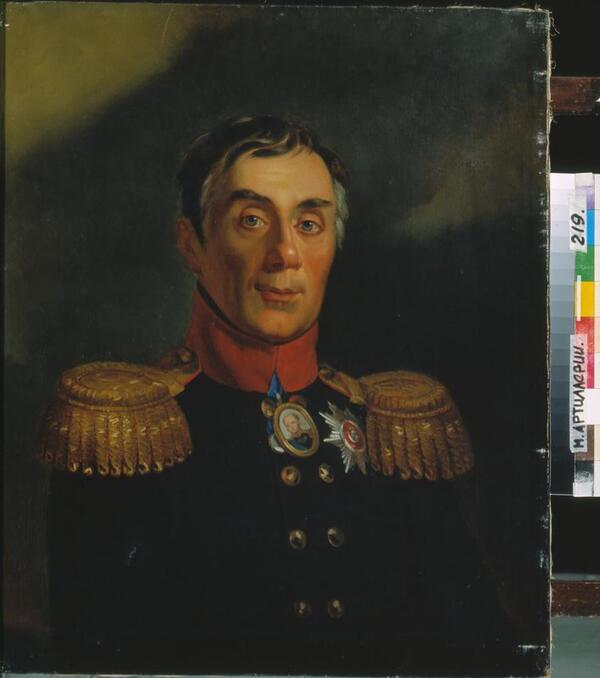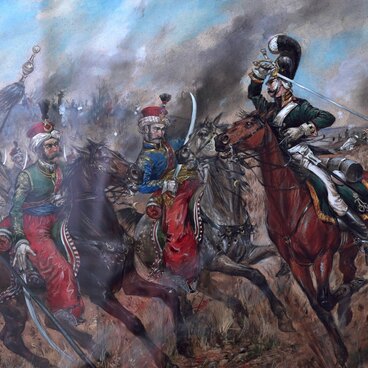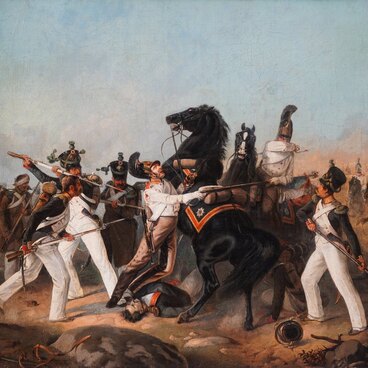Alexey Andreyevich Arakcheyev was one of the brightest and most ambiguous figures during the reign of Emperors Paul I and Alexander I.
Alexey was born in the family estate of Garusovo, Tver Governorate and learned to read and write from the rural sexton Pavel Sokolov, in 1783 he entered the Artillery and Engineering Land Gentry Cadet Corps, where his meteoric rise began. He finished a seven-year program in just four years. At the age of 18 he was already a lieutenant in the army, and in 1789 he commanded a grenadier company of the cadet corps.
By recommendations of Pyotr Ivanovich Melissino and Nikolay Ivanovich Saltykov, in 1790 Arakcheyev received the rank of captain of the army and was the senior adjutant of Melissino himself.
In September 1792, Arakcheyev arrived to Gatchina to command an artillery company, and soon with his energy, knowledge of military science and strict discipline he earned the favor of Tsarevich Pavel.
Having ascended to the throne, Paul I was not slow to advance Arakcheyev’s position. His military ranks and honorary appointments were growing very rapidly. When Arakcheyev was granted the title of count, Paul I personally wrote the motto on his coat of arms: “Loyal without Flattery”. He was engaged in the affairs of the artillery department with rare vigor. The “Arakcheyev’s guns” were in service with the Russian artillery troops throughout the Napoleonic wars.
His contemporaries called him an “iron count”, noted his petulance, cruelty and even lack of civility. His name became synonymous with crude militarism and the term “arakcheyevshchina” appeared. But this same ferocity was also fruitful: during the war, the intendants followed all the requirements and provided the soldiers with everything they needed. He once said, “You cannot forge anything with soft French speeches.” He was distinguished by his unconditional severity towards sybarites and especially towards bribe takers. Alexander I accepted Arakcheyev’s resignation, but appointed him chairman of the Department of War in the Council of State.
In 1814, Alexey Arakcheyev refused the baton of Field Marshal General, stating that he had no right to it, since he did not participate in battles. But he never parted with another award — a portrait of Alexander I which was to be worn on his chest.
In 1818, tasked by Alexander I, he developed a project to abolish serfdom, which later was used in the Emancipation Reform of 1861.
Arakcheyev was buried in his estate Gruzino at the foot of the monument to Paul I. According to his will, his body was dressed a shirt given to him by Emperor Alexander I.
The original portrait was painted in 1824 by the artist George Dawe.
Alexey was born in the family estate of Garusovo, Tver Governorate and learned to read and write from the rural sexton Pavel Sokolov, in 1783 he entered the Artillery and Engineering Land Gentry Cadet Corps, where his meteoric rise began. He finished a seven-year program in just four years. At the age of 18 he was already a lieutenant in the army, and in 1789 he commanded a grenadier company of the cadet corps.
By recommendations of Pyotr Ivanovich Melissino and Nikolay Ivanovich Saltykov, in 1790 Arakcheyev received the rank of captain of the army and was the senior adjutant of Melissino himself.
In September 1792, Arakcheyev arrived to Gatchina to command an artillery company, and soon with his energy, knowledge of military science and strict discipline he earned the favor of Tsarevich Pavel.
Having ascended to the throne, Paul I was not slow to advance Arakcheyev’s position. His military ranks and honorary appointments were growing very rapidly. When Arakcheyev was granted the title of count, Paul I personally wrote the motto on his coat of arms: “Loyal without Flattery”. He was engaged in the affairs of the artillery department with rare vigor. The “Arakcheyev’s guns” were in service with the Russian artillery troops throughout the Napoleonic wars.
His contemporaries called him an “iron count”, noted his petulance, cruelty and even lack of civility. His name became synonymous with crude militarism and the term “arakcheyevshchina” appeared. But this same ferocity was also fruitful: during the war, the intendants followed all the requirements and provided the soldiers with everything they needed. He once said, “You cannot forge anything with soft French speeches.” He was distinguished by his unconditional severity towards sybarites and especially towards bribe takers. Alexander I accepted Arakcheyev’s resignation, but appointed him chairman of the Department of War in the Council of State.
In 1814, Alexey Arakcheyev refused the baton of Field Marshal General, stating that he had no right to it, since he did not participate in battles. But he never parted with another award — a portrait of Alexander I which was to be worn on his chest.
In 1818, tasked by Alexander I, he developed a project to abolish serfdom, which later was used in the Emancipation Reform of 1861.
Arakcheyev was buried in his estate Gruzino at the foot of the monument to Paul I. According to his will, his body was dressed a shirt given to him by Emperor Alexander I.
The original portrait was painted in 1824 by the artist George Dawe.



